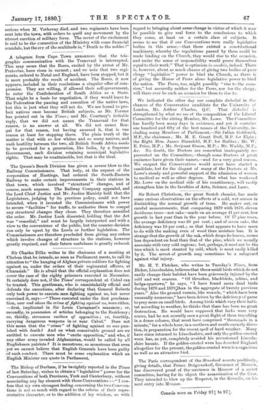Sir Charles Dilke writes to the chairman of a meeting
at 'Chelsea that he intends, as soon as Parliament meets, to call its -attention to" the hanging of Afghan private soldiers for fighting .against us, under the orders of their regimental officers, at Charasiab." He is afraid that the officiaLexplanation does not -cover the case of the eighty prisoners executed in November. It certainly does not, if the Times'. correspondent at Cabul can ibe trusted. This gentleman, who is unmistakably official and -defends the executions,. after declaring that General Roberts .only took power to execute. men fighting against us, but never .exercised it, says ;—" Those executed.under the first proclama- tion, over and above the crime .of fighting Against us, were either, —first, implicated in Sir Louis. Cavaguari's massacre; or, secondly, in possession of articles belonging to the Residency; or, thirdly; strenuous exciters of opposition. ; or, fourthly, carrying dangerous weapons in or near CabuL" Does not this mean that the " crime " of fighting against us was pun- ished with death? And on what -conceivable ground are we entitled to execute men who " excite opposition," and who, if any other army invaded .Afghanistan, would be called by all Englishmen patriots P It is monstrous, so monstrous that even :yet we cannot believe that English Generals have been guilty 'of such conduct. There must be some explanation which an English Minister can quote in Parliament.


































 Previous page
Previous page